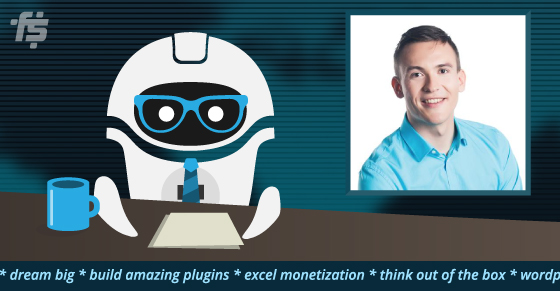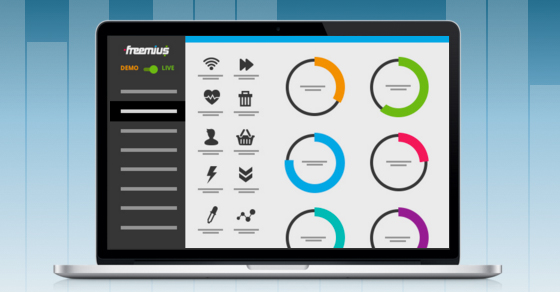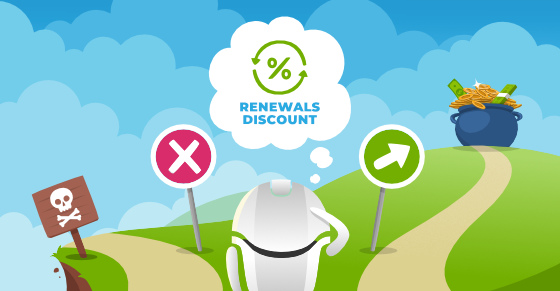|
|
I’m finally getting to interview one of my favorite figures in the WordPress community. He’s a dev & CEO at ProteusThemes and also one of the friendliest people I got to meet, so before he becomes completely unreachable – here are my WordPress product and business-oriented questions for Mr. Primož Cigler:
Primož, thanks for agreeing to answer my questions! Why don’t we kick things off by getting to know you a bit – where are you based and what did your life look like before you entered the WordPress world?
Hi, thanks for having me here on the Freemius blog, it’s a great pleasure!
I’m coming from a small country, Slovenia, which can be found in central Europe, East of Italy and South of Austria. It’s a hidden gem, but every year more popular as a tourist destination. I live and work most of the time in the capital – Ljubljana.
Hmmm, my life before I entered the WordPress world. Do you think I still remember these ancient days? 😀
As far back as I can remember, I had a mindset of an engineer. From the childhood on, I was creating and building things and I enjoyed spending the days in my grandfather’s garage, building kites or disassembling the toys I got for Christmas to learn how they work. I still love to do the hardware work outside my professional work. From baking my own sourdough bread to fixing things around the house.
What drew you into the WordPress world? What’s your “WordPress story”?
I built my first website in 2004 when I was 14. Only 2 years later, I discovered WordPress and used it first to build my personal photo blog, and then progressively started freelancing as the local businesses realized I know how to build websites. Most people expect me to have studied CS and are very surprised when I tell them I actually went to study astrophysics, even though I was making a solid income as a freelancer in the secondary school already. It was my final undergraduate year when Jaka and I started ProteusThemes. Our initial sales motivated me to graduate quickly and devote 100% of my focus into ProteusThemes. I know too many people who dropped out of college only a few exams before graduating and they mostly regret it. You have to insist till the end to get the reward and I believe that’s something I am good at – if I start something, I tend to persist until the end. I’m grateful to my parents to raise me in this spirit.
Marketing
Following your personal blog, it’s evident that you’ve transitioned from development to marketing and business development. Can you share how this happened and why? What were the main challenges? Do you like it?
Yes, I made this conscious decision in December 2016. It was when we’ve launched our own shop for premium WordPress themes and soon realized that excellent products by themselves don’t bring traffic and sales.
Excellent products by themselves don’t bring traffic and sales.
Before that, we’ve been paying someone to do the marketing for us full time, but there were no results. I don’t blame him though, I blame myself because when I employed him I didn’t know exactly what to look for and what this person will be doing. I had no idea how to do the marketing (except for the intuitive things, which are not enough in a competitive space like premium WordPress themes) so after asking for help in a Slovenian developer’s group and talking to some entrepreneurs, I figured out that I have to change my role in the company to let it grow. I am fortunate to work with the amazing people which I was able to rely on and let them do the development work I was doing so far, so I was able to shift my role to do more business development and marketing.
One of the biggest challenges was where to start and how to know I’m doing the right things? Marketing is a very broad term. What helped me a lot was that I started listening to podcasts about marketing: Online marketing made easy and Marketing school. I haven’t been a huge fan of podcasts before and I’ve started listening to them in my car. This way I didn’t need to find more time in my day-to-day work to start learning this new stuff. I’ve also learned a lot of good and useful stuff on your Freemius blog, as you and Vova are doing an amazing work with educating the WordPress products owners about how to position yourself and be a better seller. I feel lucky I know you guys!
It was also hard to accept that in marketing you don’t see the immediate results, compared to development, so the combo of not knowing if you’re doing it right and not seeing immediate results was very intimidating. But I was persistent and 6 months later the results of the hard work started to show. I feel much better now that I know I’m doing it right and will keep working in this direction.
Unlike software development, with marketing, you don’t see immediate results.
At the end of the day, I have to admit that I’m still helping with the development here and there, especially with feedback, code reviews, and the DevOps related stuff. Also, knowing how to do technical stuff is very handy when you’re doing marketing. I adapted it to my liking to some degree, and in a way, I proceed to marketing from an engineer’s perspective. We’ve started doing lots of A/B testing on our website, I tend to measure everything, spend lots of time in analytics, and I was able to do all the implementations myself. This is not the case if you’re having a marketing guy who’s not so tech savvy. Without knowing the tools and the technology behind them you probably don’t even know what are your possibilities.
What’s your perspective on WP networking events (like the one you’ve hosted during WordCamp Europe 2017)?

First of all, I want to emphasize this: you’re always doing business with people, never with companies. So networking is essential to get to know more people who can help you grow your company. You have some assets, someone else has other assets and if you put 1+1 together the math doesn’t add up to 2 anymore, but it gets better! 1 + 1 is more than 2 when entering into new partnerships.
You’re always doing business with people, never with companies. So do networking!
Networking is something I love to do naturally. The networking event I threw the night before WCEU was the most spontaneous event I’ve ever organized, yet so many people showed up. I didn’t have any plans for that evening, so I wrote that blog post and posted several times on Twitter, tagging various people I wanted to meet. I got some replies, but 10 times more people showed up and I consider it a success.
You are putting an effort into trying out different mediums with your outgoing communication. For example, I really enjoyed the video you’ve produced, providing a glimpse into your experience at WC EU 2017:
Do you see yourself investing more resources into this medium in the future? Can you see video becoming a crucial marketing channel for WordPress theme shops?
Thanks, I am glad you’ve enjoyed the video. The next time I have to do a quick interview with you and Vova as well.
In general, I believe that the podcasts I’ve mentioned above convinced me to do more video. It’s easier to digest, more inviting, and you can deliver more information across in a shorter time span. Naturally, the organic reach can be much better. It’s also a little bit harder to produce and almost impossible to outsource, so there’s less competition. I’ll definitely continue with the videos. They haven’t been a game changer for us, but I see some traction. Video allows me to come from an angle to our audience and connect better with them.
Some mediums tend to work better than the others, but I don’t believe that video is the way to go for every WordPress theme shop. The goal is to get your message across and there are many ways for how to do that. If the medium for broadcasting your message is video, go with the video. If something else works better for you and the audience accepts is better, go with that something. More important is that you know who you’re addressing, what are your goals, and how do you want to position yourself in the market. Once you know that, you ask yourself what’s the easiest, the most natural, and efficient way to get your message across. That’s also the reason why I share all my knowledge because it’s never a copy/paste strategy. No one else can apply 100% the same approach to marketing in their business and succeed. It will come out as fake and awkward. People will buy from you if they trust you and if you fake it, people can read you straight away.
Business models & Vision
It seems like you’ve been experimenting with different possible commercial business models for your company. I personally think you chose an interesting path and seeing that most of our readers are WordPress product people – I’d like to pick your brain a little on the topic:
You’ve recently revamped your pricing entirely, switching to a single, subscription-based (monthly and annual) plan. What led you to make the shift and how has the reaction to it been, so far?

Yes, it was one of those ideas that you can have in the back of your mind for a very long time, but don’t actually do it. Then suddenly, a month ago, I had a moment that we’ve been long enough searching for local maxima. It was time for a more dramatic change. In mere 2 weeks, we’ve switched over to the new pricing terms – subscription payment. The rest of the team was very skeptical, but I insisted we at least try for a couple of months. I tried to do it the right way and followed much advice on Vova’s article, so I’ve announced the change and let our customers know via all channels. The feedback was way more positive than we, including me, expected. But I didn’t want to get too excited because we know how the saying goes: money talks, bullshit walks. If they say they will buy it, it doesn’t mean they will.
A more tangible positive sign was that some of our existing customers reached out to me proactively to see if we would upgrade them from the old Theme Club to the new one right away, which we did. We’ve respected the old terms of sale and these existing customers are now on the yearly subscriptions with a 50% discount.
When we made the switch, for a couple of days we saw a shock effect, where we didn’t see any new sales coming in. But after a week things went back to normal and now we’re seeing between 2 and 5 new sign ups a day, which is what I anticipated. Most of them are monthly payments which will hopefully upgrade to the yearly plans in the upcoming months.
We’re seeing a growth in July, which is very unusual in the tech industry. It seems it was the right decision, but it’s too early to draw any conclusions. For now, I can say that nobody is canceling their subscription right after the purchase, which is inspiring.
While we’re on the subject, how do you feel about the announcement by Jetpack which had recently introduced a subscription plan that provides the plugin’s users with access to well over 200 commercial WordPress themes? Do you feel like other WordPress theme sellers are at a commercial disadvantage when compared with Jetpack’s available distribution channels, especially WordPress.com?
Short term I don’t believe this will have any significant impact. I don’t see lots of our users using Jetpack so it will take some time for our customers, who are freelancers and small agencies, to realize Jetpack’s offer. On the other hand, I am not very familiar with the selection of themes available from WordPress.com, but my expectation is that most of them are not as business-oriented as ours, which gives us an advantage, not directly competing with them.
Long term I’m not worried as well because I’m working towards a goal where in a year from now only half of our revenue will be coming from the WordPress theme sales. I’m working on at least three interesting projects at the moment, where each of them has a potential to become our new main source of revenue.
The first one is a service called FreshlyWP for WP instances on-demand, serving as a selling tool where potential customers can try out your product before they buy it. We’re using it ourselves and we see incredibly good results, as it helps a lot with the sales. The system is very powerful and can easily handle thousands of WP installations at its current stage already (a single VPS). I’m working on a landing page at the moment where it will be presented in details. I know demand here is huge and some other companies are already offering similar services, but ours will have a tremendous focus on marketing and analytics, as well as offering automatic ways to keep these instances in sync with your existing demos. All of these are pain points I’m having myself, but I’m developing a solution in a way I can sell it as a SaaS to others as well.
The second one is connected to the FreshlyWP and our One Click Demo Import solution which has recently crossed 100,000 active installations. It’s available in the WP plugin repository only for a year now, without any additional efforts in marketing. We cannot monetize it directly, but I know that preparing the XML files which the One Click Demo Import is using is a tedious job. We’ll use part of the FreshlyWP codebase to allow authors to automate the part where they have to prepare the XML files manually and then do the procedure every time they change something on their product demo if they want their users to match the imported content with the demo. In the new system, this will be a push of the button in your WP admin. All the other things will happen magically on our infrastructure and provide you with the CDN hosted XML file you can feed to the One Click Demo Import directly.
The third thing, planned for Q1 2018, is the new platform for niche, local businesses, similar to Squarespace, Wix or Shopify. The current flow of the WordPress site setup is suboptimal in many stages, to say the least. With that platform, we aim to bridge the gap. We’re partnering up with other SaaS businesses who will provide the necessary infrastructure. They are already hosting about 30,000 WordPress blogs at the moment in a similar manner, so I’m confident we can do something extraordinary together. We will differentiate ourselves from other big names like Squarespace in the same way we did within the themes’ market – we will be providing more complete, tailored solutions to various niches. Going more niche can be a great advantage by itself. You can better address your ideal customer and serve them better.
Going more niche can be a great advantage – you can better address and serve your ideal customer.
Bearing in mind the potential premium theme market imbalance, as well as the fact that according to a study we published only 5.6% of the WordPress themes on ThemeForest earn more than $3,000 per month, what can WordPress theme shops do to maintain an advantage in an increasingly competitive market?
I don’t know the silver bullet, if you know what that would be, I’d be glad to know, haha! 😀
Selling on the ThemeForest marketplace is mostly wandering around with your eyes closed. After being an author there for almost 5 years now, we still don’t know what exactly makes a successful theme there. Being the first to provide a good theme for a specific niche worked well like we did with one of the first construction themes in 2014, but that has been well covered since. So now you’re left with the trends which might be a good quick cash but are a constant struggle and don’t work well in the long run.
Having the data, talking to customers, and “owning them” is the logical step once you verify your product on the marketplace. They are great for the beginning, but if you want to build a sustainable business, you have to sell on your own.
Marketplaces are great at the beginning, but for a sustainable business, you have to sell on your own!
As far as I can see, your theme shop sells WordPress themes on its own website, as well as on the Envato marketplace. Do you think that WordPress theme sellers who sell exclusively through ThemeForest suffer from any sort of commercial disadvantage when compared with those who sell outside of it? What are some of the commercial considerations a WordPress theme seller needs to take into account in that regard?
Yes, since opening our shop, we’ve kept the majority of our themes on ThemeForest. It is still a great source of revenue, but most importantly, it’s not the only one anymore.
Now, after almost a year of selling on our own shop, I’m starting to realize we haven’t even been a proper business until we were selling exclusively through ThemeForest. Yes, you’re making money selling your own products and you are leading a team. But for example, what happens if you want to exit? You’re only a user in the marketplace… Selling accounts is against their TOS. If they change the rules, you’re forced to accept them or you have to close down. Basically, they own you and can do whatever they want with your business.
However, things change drastically when you develop your own selling channels. The business becomes more stable, independent, and it has very positive consequences on your valuation. You can start getting into partnerships, you start owning the buyers and have direct communication with them, you can start measuring the impact of the changes you implement in your products, demo pages, landing pages and your website. You can start advertising and measure the ROI. There are many upsides!
If you’re still deciding which path to go, I think it comes to what are your ultimate goals. Going the independent route is not appropriate nor viable for everybody because it’s much harder to establish and it takes much more energy and time than selling on an existing marketplace. It took us, a team of 6, almost half a year to launch it and then even more time to learn how to position ourselves and gain the traffic. But for me and for us, it was worth it and I don’t regret the decision.
Grab a free copy of our Cheat Sheet for
Selling Plugins and Themes
A growth roadmap with concise, actionable tips for every milestone of WordPress product development.

What will the WordPress commercial theme ecosystem look like in 5 years from now?
We’ll take over the majority of the market share with that new platform we’re launching in 2018 😀
It’s a joke, but there’s some truth in that as well. I believe there will be more platforms which will provide easier onboarding. The customers will still be sold on the look of the themes, but they will be integrated into SaaS businesses or hostings, instead of selling ZIP files. I’ve mentioned this before and I will mention it again: the current onboarding flow is broken. Let’s fix it. WordPress has a beautiful future, but its role will have to change.
Entrepreneurial Input
Where do you see yourself in 5 years from today?
In a mirror? 😀
I want to bootstrap these 3 new ventures I’ve mentioned above and see what sticks and what doesn’t. Most probably I won’t find a market fit in all three of them, but I have a feeling at least one of these three will be huge, much bigger than ProteusThemes is today.
Whatever happens, I want to be doing different things than I’m doing today. I can’t stand doing the same things day after day, year after year. The routine is killing me.
If you had a time machine and you could go back in time to when you just started your premium WordPress themes shop, what would you do differently?
I’d kick myself earlier to start learning about the marketing, building the audience earlier. I’d still go with the ThemeForest as we did from the start, but invest some of my focus early on into our own website and our online presence.
If I were to give one advice to myself 5 years ago, it would be to start with the content marketing back then already. The whole team started contributing to our blog with thorough ultimate guides a couple of months back. The one for image optimization was published the week when WCEU was happening and the other one for the child themes by the end of June. It’s highly valuable and thorough content on a specific topic and we’re already seeing a huge increase in fresh traffic coming to our site through these two pieces of content alone. I noticed you’ve also started the same approach, which makes me wonder if I had anything to do with it. 🙂
What’s one good tip you can provide for developers who are looking to start a WordPress theme business today?
Let’s make it three:
- Don’t try to copy the existing success stories. The market is saturated already, it doesn’t need another theme that’s similar to an existing one.
- Don’t compete on features or price. Features without the context are useless and people don’t care much about them anymore.
- If you’re in here for a long game, think about your unique value proposition. How can you differentiate? What is your strongest point? What can you do really good that nobody else can?
Primož, thank you very much for agreeing to answer my questions, and for being so cooperative and open about your interesting entrepreneurial journey in the WordPress sphere. I think you have a very healthy approach to business and I’m sure people can learn a LOT simply by listening to what you have to say and look at you go.
Can’t wait to see where your adventures take you next!







